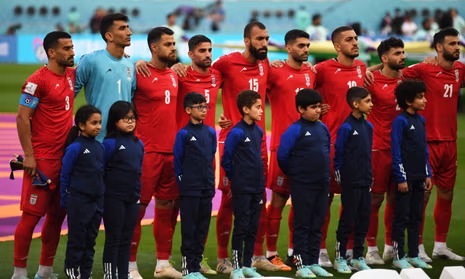
I have always said that sports and politics are inseparable. And football, more than any other sport, has always made for strong, peaceful protest with real ramifications for society. At the World Cup in Qatar in 2022, when Iran’s footballers stood in front of the world but did not sing the national anthem with billions watching, it was an act of silent resistance. Like what happened in Kolkata on Sunday, it has stayed on as a powerful image of peaceful protest, which was much talked about the world over.
Again, when the Germans posed for a team photograph with hands on their mouths in an act of telling the world that they were being gagged, it was a gesture that had far-reaching ramifications. While they did not force the wearing of the One Love Armband, they made sure that their discomfort and frustration was known by doing what they did. And they did this in front of a senior German minister who sat very close to the FIFA President while wearing the armband. The point, in all fairness, was made. The world media had taken notice and the issue was driven home.
India too has had its share of political moments in sport. The standout was the refusal to perform the Hitler salute in front of the German Chancellor at the opening ceremony of the 1936 Games. More recently, the Indian cricket team too showed solidarity with the army by wearing armed-forces insignia on their caps, a gesture that was much talked about in the cricket world.
For the Latest Sports News: Click Here

Some had asked what would happen to the Iranian footballers when they went back home. How would the political class react to the captain’s press conference where questions were openly asked about the lack of freedom for people back in Iran? Similar questions were asked of Subhasish Bose, captain of Mohun Bagan Super Giant, who had joined the peaceful protests in Kolkata on Sunday.
While we don’t know what will happen to Bose, what we can say, however, is that none of these men are unaware of the consequences. And yet, they did what they did – made a statement in front of the world and attracted global attention. Far more than a win or a loss, this is an act that has endeared Bose to many. It shows a kind of courage and resilience that defines him as a sportsman. And it is this courage that will allow him to deal with whatever comes his way.
What Sunday did was yet again bring to the fore the point that sport makes room for peaceful protest and draws attention to issues in a manner that few other spheres of human endeavour are able to do. Events like the Derby are, and will continue to serve as, platforms for peaceful protest and will forever be used to make larger political statements.

Anyone who denies this isn’t aware of the true potential of sport. Ahead of Beijing 2008, Tibet became an issue of serious international concern. It was brought to the fore after years and China was in a spot faced with stinging global criticism. London 2012 was no different, and there was much talk during the flame relay. In Rio 2016, the window dressing of the city’s problems was highlighted by the global media leaving the organisers red-faced.
Will these acts lead to any real change? Will they alter anything at all? Maybe not. But then, it is important to make the point. Footballers or sports fans aren’t social reformers. Their job is not to arrest the perpetrators of the crime. That’s not their remit. That’s the job of the CBI and the police. But by doing what they did in front of a huge television and digital audience, the fans and Bose managed to highlight issues of concern. They have posed the right questions. That’s all we need. And that’s what sport allows us to do. And that’s why we celebrate Bose, the fans, and the power of sport.
Also Read: From Olympic torch relays to Derby protests – sport and inclusion



